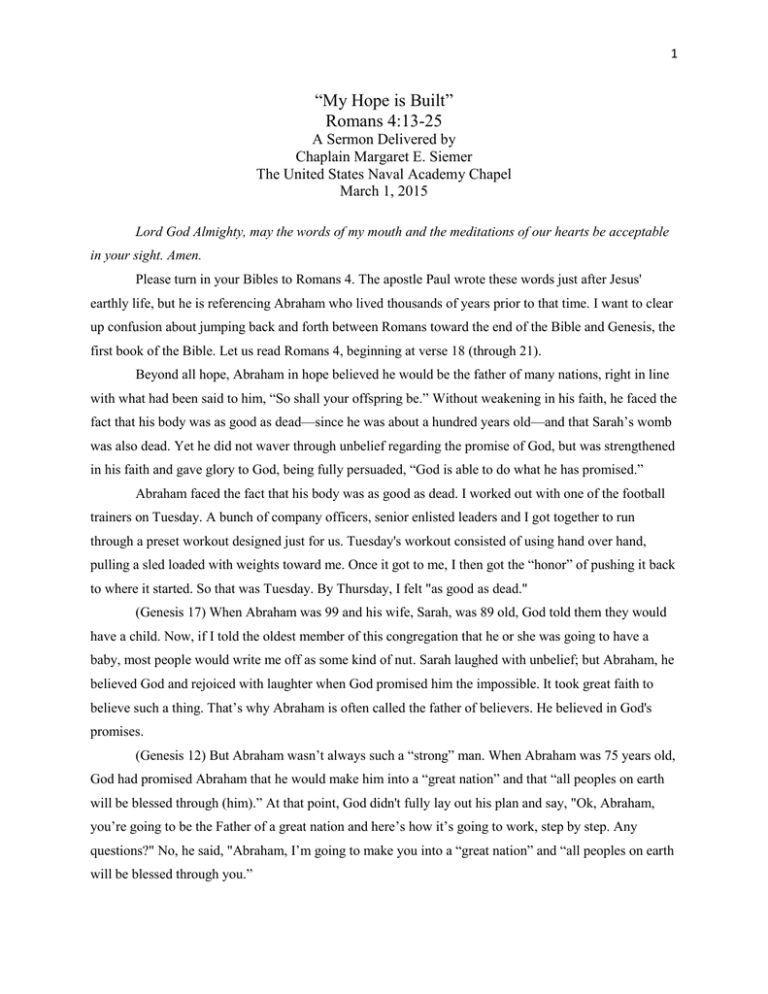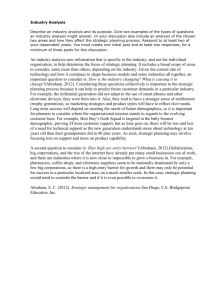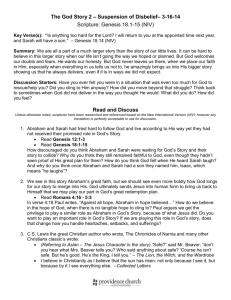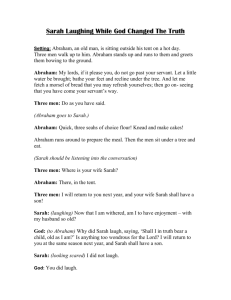“My Hope is Built” Romans 4:13-25 A Sermon Delivered by
advertisement

1 “My Hope is Built” Romans 4:13-25 A Sermon Delivered by Chaplain Margaret E. Siemer The United States Naval Academy Chapel March 1, 2015 Lord God Almighty, may the words of my mouth and the meditations of our hearts be acceptable in your sight. Amen. Please turn in your Bibles to Romans 4. The apostle Paul wrote these words just after Jesus' earthly life, but he is referencing Abraham who lived thousands of years prior to that time. I want to clear up confusion about jumping back and forth between Romans toward the end of the Bible and Genesis, the first book of the Bible. Let us read Romans 4, beginning at verse 18 (through 21). Beyond all hope, Abraham in hope believed he would be the father of many nations, right in line with what had been said to him, “So shall your offspring be.” Without weakening in his faith, he faced the fact that his body was as good as dead—since he was about a hundred years old—and that Sarah’s womb was also dead. Yet he did not waver through unbelief regarding the promise of God, but was strengthened in his faith and gave glory to God, being fully persuaded, “God is able to do what he has promised.” Abraham faced the fact that his body was as good as dead. I worked out with one of the football trainers on Tuesday. A bunch of company officers, senior enlisted leaders and I got together to run through a preset workout designed just for us. Tuesday's workout consisted of using hand over hand, pulling a sled loaded with weights toward me. Once it got to me, I then got the “honor” of pushing it back to where it started. So that was Tuesday. By Thursday, I felt "as good as dead." (Genesis 17) When Abraham was 99 and his wife, Sarah, was 89 old, God told them they would have a child. Now, if I told the oldest member of this congregation that he or she was going to have a baby, most people would write me off as some kind of nut. Sarah laughed with unbelief; but Abraham, he believed God and rejoiced with laughter when God promised him the impossible. It took great faith to believe such a thing. That’s why Abraham is often called the father of believers. He believed in God's promises. (Genesis 12) But Abraham wasn’t always such a “strong” man. When Abraham was 75 years old, God had promised Abraham that he would make him into a “great nation” and that “all peoples on earth will be blessed through (him).” At that point, God didn't fully lay out his plan and say, "Ok, Abraham, you’re going to be the Father of a great nation and here’s how it’s going to work, step by step. Any questions?" No, he said, "Abraham, I’m going to make you into a “great nation” and “all peoples on earth will be blessed through you.” 2 After this initial promise was made, doubt began creeping into Abraham’s mind. He couldn't see the logistics of God's plan. (Have you been there?) Later on, when God appeared to him in Genesis 15, Abraham said to him, “O Sovereign LORD, what can you give me since I remain childless?” Will my estate go to a servant in my household? Is this the way you plan to bring about your promise? Abraham considered that God must have been speaking figuratively when he said that he would be a “great nation.” But God reiterated to Abraham, “This man (this servant of yours) will not be your heir, but a son coming from your own body will be your heir.” God told Abraham - go ahead and count the stars! Do you know how long that would take? The Milky Way has 100 billion or so stars in it. At one a second it would take 33 years to count a billion. Then God said "Abraham, that’s how many descendants you'll have. That's a pretty big promise, especially considering his age. Time went by and Abraham's wife, Sarah, did not conceive, so she considers that maybe she wasn't in on the plan. Being the resourceful woman she was, she decided that in order to bring this about, she would have her servant bear Abraham's child. This was common practice in that culture. If a woman couldn't conceive, her servant would serve as a surrogate and this was considered to be a step up on the social ladder since she might become the mother of a great tribal leader. So Sarah gave Abraham her slave, Hagar to bring about this "plan." This was not a good idea. Maybe Abraham also reasoned that God could have meant just he would be the forerunner of Christ, not both him and his God-given wife. Sarah’s servant, Hagar, conceived a son, Ishmael, and that’s a message for another day. But suffice to say, this was not how God envisioned his plan. (Genesis 17:15-17) God came back to Abraham again to set the record straight. “As for Sarai your wife, you are no longer to call her Sarai; her name will be Sarah. I will bless her and will surely give you a son by her. I will bless her so that she will be the mother of nations; kings of peoples will come from her.” There was no room for misinterpretation left. Finally, Abraham fell face down and laughed in pure joy saying, “Will a son be born to a man a hundred years old? Will Sarah bear a child at the age of ninety?” God reiterated again, your wife Sarah will bear you a son, and you will call him Isaac. Long story short, Sarah and Abraham conceived a son and they named him Isaac. He became the father of Jacob who became the father of twelve sons, from whom the nation of Israel descended. And also from whom our Lord Jesus descended. The moral of the story....God keeps his promises. Not always in the way we think he might or in our time frame. But he is always faithful. As a culture, as flawed human beings, we have a tendency to put people of faith on pedestal, expecting them to be perfect, or worse, anticipating their fall when they mess up. We have a tendency to idealize Christians as always being hopeful, always able to rejoice in affliction, and always upbeat and 3 positive in life. But more often than not we find ourselves looking at things like Abraham did - logically and getting ourselves in trouble. God's ways are not our ways and, frankly, sometimes they seem a bit messed up. While this may be liberating for some like me who accept life's mysteries on faith, for others the illogical nature of our faith can be a stumbling block. Think about this: if one can build a house in 12 days, it makes sense that twelve could do it one day. Right? So if one Naval ship can cross the Atlantic in six days, six Naval ships can cross it in one day, right? Now I'm sure most of you have some sort of theory beyond this that is way beyond my capability to understand, but my point is that sometimes theories don't make sense. And sometimes faith doesn't make sense. If we try to prove or reason things of faith, is it still faith? Faith is the substance of things hoped for, the evidence of things not seen. Hope and faith are very similar. Hope is the desire and expectation that something is going to happen. Faith is the confidence that it will happen. Getting back to Abraham and Sarah, they spent 25 years hoping and waiting from the time they received the original promise of a son until that son came. Faith and hope work together; they both rest on the same foundation: the promises of God. What can we learn from the experience of Abraham and Sarah? What are the takeaways? How do we develop that kind of faith? We don't do it by concentrating on building our faith. Rather, we build our faith by shifting our focus to the object worthy of our faith. Focus on the time-tested attributes of God seen through his word, through the lives of others and maybe even your own life. God kept his promises to Abraham and he will keep his promises to you. Focus on the object of your faith....God. Trust in him, even (especially) when you can't see the big picture. God never promised to give us his detailed plan with footnotes and links to helpful websites. He never promised to give us all the pieces of the puzzle. But he does promise and is faithful to meet our needs, love us, never leave us or forsake us. I, for one, am so glad God doesn't reveal to me the plans he has for me each day, lest I never get of bed. He gives us just what we need, when we need it. Trust in him. Closely related, it worth mentioning, don't micromanage God. Do you like it when people micromanage you? He's got this. He knows the plans he has for your life. Let God be God. Work toward actively surrendering to the one who knows you best because he created you. The one who created the universe and loves you beyond all comprehension. The other day, I was feeling the weight of the world on my shoulders. While consciously I didn't think I was anyone's savior, my behavior reflected that I was trying to be. I knew where I was and where I needed to be. I just couldn’t figure out how to connect the two. I talked it through with Chaplain Gore and we developed some courses of action to get me where I needed to be. His words? Rest easy. Let God be God. (That'll preach...and it just did. ;-) 4 Focus on the object of your faith Trust in him. And let God be God. Amen.







